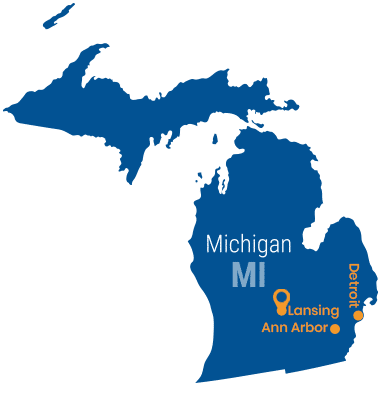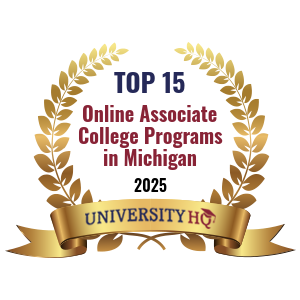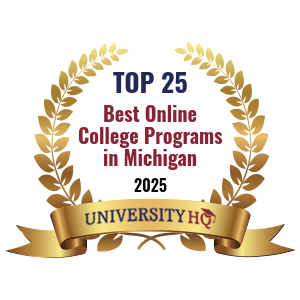University Headquarters (HQ) is an industry-leading, independent educational organization that provides independent college rankings using a proprietary formula to create first class, unbiased rankings. The team at University HQ strives to provide accurate and trustworthy rankings that highlight the best programs in Michigan.
Featured Online Programs
Are you thinking about attending an online college in Michigan? The state is home to many academic institutions that offer remote learning programs. Students can choose from a wide variety of degree programs at the associate, bachelor’s, and master’s levels. Some schools even offer online PhD and doctorate degrees in some subject areas.
Enrolling in an online degree program in Michigan can be very rewarding and professionally beneficial. Employment opportunities will ultimately depend on the type of degree earned, but graduates are generally more competitive in the job market, especially when compared to candidates who lack higher education. Individuals with degrees are often perceived as better qualified and capable in the workplace, which can offer a greater sense of security and may lead to more advancement opportunities. Graduates also tend to make more money, especially those with higher-level degrees.
As of February 2022, the civilian labor force in Michigan was 4,804,200. Of these employable individuals, 4,576,200 had jobs and 228,000 did not. This makes the state’s unemployment rate for the state 4.7%. This is down significantly from the year before when unemployment was 6.3%. In fact, Michigan has seen a consistent decline in unemployment rates since hitting a record high in April 2020. Prior to this, the unemployment rate was 3.8%.
Read MoreIn May 2020, Michigan had a mean hourly wage of $25.67 and an annual mean wage of $53,390. While this is below the national annual wage of $56,310, those with college degrees will tend to have more job prospects that may result in higher salary potential. It’s important to realize, however, that the level of education obtained will impact overall salary potential.
Additionally, prospective students should research which industries pay the most. Salary potential can vary significantly.
In Michigan, some of the jobs with the highest demand and wages include:
- Accountants and Auditors
- Carpenters
- Electricians
- Financial Managers
- Industrial Production Managers
- Management Analysts
- Medical and Health Services Managers
- Registered Nurses

Online Higher Education in Michigan
For the 2020-2021 academic year, there were a total of 501,836 students enrolled at Michigan colleges and universities. This includes 426,507 undergraduate and 75,329 graduate school students. Most attended school full-time, with only 185,076 enrolled part-time.
Notably, just under half of Michigan students were enrolled in online degree options exclusively, with 218,455 opting to take classes 100% virtually. An additional 161,731 were also taking some online classes. Only 121,650 students were not enrolled in any distance learning opportunities. This means that over 75% of undergraduate and graduate students in the state took at least one online class during the 2020-2021 academic year.
Find Your Online Michigan Program
In 2022, the average cost of undergraduate tuition and fees was $7,112 per academic year for Michigan residents. Rates were higher for students from other states, however, who paid an average of $12,438 for the same period. This trend also applies to graduate students, with in-state students paying an average of $17,123 and out-of-state students paying an average of $24,821. Those attending private graduate schools can expect to pay an average of $18,598, regardless of residency status.
Other costs include living expenses, books, and supplies. In 2022, the average living costs of Michigan colleges and universities is $12,899 for students staying on campus and $12,922 for students staying off campus. The average cost of books and supplies is $3,545 for both groups, as drastic increase from the year before when it was only $1,222.
Enrolling in online college and university programs in Michigan is one potential way to save on higher education expenses. This is because some schools charge less for remote learning. Distance learners also do not have to pay the parking and activity fees often required of traditional students. Additionally, most institutions offer the same financial aid opportunities for online students. This means those interested in attending classes remotely should plan to complete and submit Free Application for Federal Student Aid (FAFSA) forms to their school’s finance department.
Our School Rankings Methodology
College and university rankings are an excellent resource for prospective students trying to decide which academic programs to pursue. The information provided can help ensure the degrees selected align well with professional goal, as well as with personal aspirations.
Using a proprietary ratings system, our team ranks Michigan schools that offer online college programs. This system increases accuracy and ensures results are applicable to every type of student.
Some of the data types utilized to generate our rankings include:
- Average Graduate Salary
- Graduation Rate
- Net Price
- Reputation
- Retention Rate
- Student-to-Faculty Ratio
Additionally, our data collection process is solely focused on properly accredited colleges and universities offering credible online courses in the state. Our team performs extremely thorough investigations and assessments to develop the list of top online programs available in Michigan. In order to help students make the best decisions possible, we also carefully consider the overall the quality and affordability of each institution before adding it to the list.
Top 15 Best Online Associate & Community Colleges in Michigan
Northwestern Michigan College
Score: 89.02
- Undergraduate Tuition
- In-State: $10,076
- Out-of-State:$12,762
- Net Price: $5,831
- Acceptance Rate: 100%
- Retention Rate: 81%
- Graduation Rate: 25%
- Total Enrollment: 3,146
- Undergrad Students: 3,146
- Graduate Students: N/A
- Grads Salary: $43,400
- Student-to-faculty: 12:1
Washtenaw Community College
Score: 87.66
- Undergraduate Tuition
- In-State: $4,584
- Out-of-State:$6,336
- Net Price: $3,588
- Acceptance Rate: 100%
- Retention Rate: 65%
- Graduation Rate: 30%
- Total Enrollment: 10,756
- Undergrad Students: 10,756
- Graduate Students: N/A
- Grads Salary: $37,500
- Student-to-faculty: 18:1
St. Clair County Community College
Score: 84.36
- Undergraduate Tuition
- In-State: $8,506
- Out-of-State:$11,826
- Net Price: $6,926
- Acceptance Rate: 100%
- Retention Rate: 65%
- Graduation Rate: 32%
- Total Enrollment: 3,105
- Undergrad Students: 3,105
- Graduate Students: N/A
- Grads Salary: $38,200
- Student-to-faculty: 16:1
Lansing Community College
Score: 79.75
- Undergraduate Tuition
- In-State: $7,520
- Out-of-State:$11,030
- Net Price: $3,031
- Acceptance Rate: 100%
- Retention Rate: 64%
- Graduation Rate: 23%
- Total Enrollment: 9,207
- Undergrad Students: 9,207
- Graduate Students: N/A
- Grads Salary: $31,700
- Student-to-faculty: 12:1
Muskegon Community College
Score: 79.05
- Undergraduate Tuition
- In-State: $11,510
- Out-of-State:$15,390
- Net Price: $7,829
- Acceptance Rate: 100%
- Retention Rate: 64%
- Graduation Rate: 31%
- Total Enrollment: 3,518
- Undergrad Students: 3,518
- Graduate Students: N/A
- Grads Salary: $35,600
- Student-to-faculty: 17:1
Kellogg Community College
Score: 77.75
- Undergraduate Tuition
- In-State: $5,748
- Out-of-State:$7,902
- Net Price: $4,977
- Acceptance Rate: 100%
- Retention Rate: 65%
- Graduation Rate: 26%
- Total Enrollment: 3,734
- Undergrad Students: 3,734
- Graduate Students: N/A
- Grads Salary: $30,400
- Student-to-faculty: 11:1
Oakland Community College
Score: 76.16
- Undergraduate Tuition
- In-State: $5,560
- Out-of-State:$5,560
- Net Price: $4,834
- Acceptance Rate: 100%
- Retention Rate: 53%
- Graduation Rate: 19%
- Total Enrollment: 13,831
- Undergrad Students: 13,831
- Graduate Students: N/A
- Grads Salary: $39,900
- Student-to-faculty: 22:1
Macomb Community College
Score: 70.64
- Undergraduate Tuition
- In-State: $6,510
- Out-of-State:$8,220
- Net Price: $5,317
- Acceptance Rate: 100%
- Retention Rate: 64%
- Graduation Rate: 16%
- Total Enrollment: 15,983
- Undergrad Students: 15,983
- Graduate Students: N/A
- Grads Salary: $37,400
- Student-to-faculty: 26:1
Bay de Noc Community College
Score: 68.71
- Undergraduate Tuition
- In-State: $9,540
- Out-of-State:$11,280
- Net Price: $9,457
- Acceptance Rate: 100%
- Retention Rate: 47%
- Graduation Rate: 21%
- Total Enrollment: 1,996
- Undergrad Students: 1,996
- Graduate Students: N/A
- Grads Salary: $38,400
- Student-to-faculty: 17:1
Delta College
Score: 66.37
- Undergraduate Tuition
- In-State: $7,250
- Out-of-State:$7,550
- Net Price: $5,977
- Acceptance Rate: 100%
- Retention Rate: 60%
- Graduation Rate: 17%
- Total Enrollment: 7,646
- Undergrad Students: 7,646
- Graduate Students: N/A
- Grads Salary: $29,800
- Student-to-faculty: 15:1
Mid Michigan College
Score: 64.58
- Undergraduate Tuition
- In-State: $8,446
- Out-of-State:$8,446
- Net Price: $8,954
- Acceptance Rate: 100%
- Retention Rate: 56%
- Graduation Rate: 18%
- Total Enrollment: 3,416
- Undergrad Students: 3,416
- Graduate Students: N/A
- Grads Salary: $37,500
- Student-to-faculty: 26:1
Kirtland Community College
Score: 63.61
- Undergraduate Tuition
- In-State: $6,990
- Out-of-State:$9,390
- Net Price: $10,407
- Acceptance Rate: 100%
- Retention Rate: 57%
- Graduation Rate: 26%
- Total Enrollment: 1,538
- Undergrad Students: 1,538
- Graduate Students: N/A
- Grads Salary: $29,200
- Student-to-faculty: 17:1
Grand Rapids Community College
Score: 61.56
- Undergraduate Tuition
- In-State: $8,049
- Out-of-State:$11,859
- Net Price: $11,137
- Acceptance Rate: 100%
- Retention Rate: 63%
- Graduation Rate: 18%
- Total Enrollment: 12,142
- Undergrad Students: 12,142
- Graduate Students: N/A
- Grads Salary: $35,500
- Student-to-faculty: 20:1
Schoolcraft College
Score: 59.84
- Undergraduate Tuition
- In-State: $5,982
- Out-of-State:$7,906
- Net Price: $7,271
- Acceptance Rate: 100%
- Retention Rate: 18%
- Graduation Rate: 15%
- Total Enrollment: 7,596
- Undergrad Students: 7,596
- Graduate Students: N/A
- Grads Salary: $34,800
- Student-to-faculty: 21:1
Top 25 Best Online Colleges in Michigan
University of Michigan-Ann Arbor
Score: 90.86
- Undergraduate Tuition
- In-State: $17,228
- Out-of-State:$58,072
- Net Price: $19,005
- Acceptance Rate: 18%
- Retention Rate: 98%
- Graduation Rate: 93%
- Total Enrollment: 52,065
- Undergrad Students: 33,730
- Graduate Students: 18,335
- Grads Salary: $88,000
- Student-to-faculty: 11:1
University of Detroit Mercy
Score: 77.34
- Undergraduate Tuition
- In-State: $32,300
- Out-of-State:$32,300
- Net Price: $17,987
- Acceptance Rate: 80%
- Retention Rate: 82%
- Graduation Rate: 68%
- Total Enrollment: 5,528
- Undergrad Students: 3,352
- Graduate Students: 2,176
- Grads Salary: $84,000
- Student-to-faculty: 12:1
Michigan Technological University
Score: 76.55
- Undergraduate Tuition
- In-State: $18,392
- Out-of-State:$41,340
- Net Price: $17,928
- Acceptance Rate: 88%
- Retention Rate: 88%
- Graduation Rate: 69%
- Total Enrollment: 7,313
- Undergrad Students: 5,892
- Graduate Students: 1,421
- Grads Salary: $82,000
- Student-to-faculty: 13:1
University of Michigan-Dearborn
Score: 76.41
- Undergraduate Tuition
- In-State: $14,944
- Out-of-State:$31,360
- Net Price: $12,798
- Acceptance Rate: 59%
- Retention Rate: 81%
- Graduation Rate: 57%
- Total Enrollment: 8,035
- Undergrad Students: 6,071
- Graduate Students: 1,964
- Grads Salary: $81,000
- Student-to-faculty: 16:1
Kettering University
Score: 73.79
- Undergraduate Tuition
- In-State: $46,380
- Out-of-State:$46,380
- Net Price: $33,616
- Acceptance Rate: 79%
- Retention Rate: 93%
- Graduation Rate: 71%
- Total Enrollment: 1,605
- Undergrad Students: 1,290
- Graduate Students: 315
- Grads Salary: $96,000
- Student-to-faculty: 11:1
Michigan State University
Score: 73.12
- Undergraduate Tuition
- In-State: $15,988
- Out-of-State:$43,372
- Net Price: $24,630
- Acceptance Rate: 84%
- Retention Rate: 91%
- Graduation Rate: 82%
- Total Enrollment: 51,316
- Undergrad Students: 40,483
- Graduate Students: 10,833
- Grads Salary: $79,000
- Student-to-faculty: 17:1
Oakland University
Score: 71.02
- Undergraduate Tuition
- In-State: $14,694
- Out-of-State:$23,188
- Net Price: $15,734
- Acceptance Rate: 70%
- Retention Rate: 75%
- Graduation Rate: 57%
- Total Enrollment: 15,922
- Undergrad Students: 12,719
- Graduate Students: 3,203
- Grads Salary: $77,000
- Student-to-faculty: 17:1
Andrews University
Score: 69.93
- Undergraduate Tuition
- In-State: $33,710
- Out-of-State:$33,710
- Net Price: $24,874
- Acceptance Rate: 87%
- Retention Rate: 83%
- Graduation Rate: 66%
- Total Enrollment: 2,837
- Undergrad Students: 1,312
- Graduate Students: 1,525
- Grads Salary: $78,000
- Student-to-faculty: 10:1
Saginaw Valley State University
Score: 68.29
- Undergraduate Tuition
- In-State: $12,240
- Out-of-State:$28,752
- Net Price: $15,144
- Acceptance Rate: 73%
- Retention Rate: 75%
- Graduation Rate: 54%
- Total Enrollment: 6,889
- Undergrad Students: 6,184
- Graduate Students: 705
- Grads Salary: $70,000
- Student-to-faculty: 15:1
Ferris State University
Score: 68.2
- Undergraduate Tuition
- In-State: $13,630
- Out-of-State:$13,630
- Net Price: $13,154
- Acceptance Rate: 81%
- Retention Rate: 73%
- Graduation Rate: 48%
- Total Enrollment: 9,918
- Undergrad Students: 8,940
- Graduate Students: 978
- Grads Salary: $72,000
- Student-to-faculty: 15:1
University of Michigan-Flint
Score: 68.15
- Undergraduate Tuition
- In-State: $14,014
- Out-of-State:$31,274
- Net Price: $12,344
- Acceptance Rate: 69%
- Retention Rate: 76%
- Graduation Rate: 45%
- Total Enrollment: 6,130
- Undergrad Students: 4,751
- Graduate Students: 1,379
- Grads Salary: $69,000
- Student-to-faculty: 14:1
Lawrence Technological University
Score: 68.14
- Undergraduate Tuition
- In-State: $41,872
- Out-of-State:$41,872
- Net Price: $33,807
- Acceptance Rate: 80%
- Retention Rate: 77%
- Graduation Rate: 63%
- Total Enrollment: 3,260
- Undergrad Students: 2,367
- Graduate Students: 893
- Grads Salary: $92,000
- Student-to-faculty: 11:1
Spring Arbor University
Score: 68.13
- Undergraduate Tuition
- In-State: $32,580
- Out-of-State:$32,580
- Net Price: $21,720
- Acceptance Rate: 37%
- Retention Rate: 74%
- Graduation Rate: 60%
- Total Enrollment: 2,390
- Undergrad Students: 1,091
- Graduate Students: 1,299
- Grads Salary: $68,000
- Student-to-faculty: 11:1
Western Michigan University
Score: 67.73
- Undergraduate Tuition
- In-State: $15,298
- Out-of-State:$19,098
- Net Price: $20,183
- Acceptance Rate: 85%
- Retention Rate: 80%
- Graduation Rate: 58%
- Total Enrollment: 16,693
- Undergrad Students: 13,026
- Graduate Students: 3,667
- Grads Salary: $76,000
- Student-to-faculty: 16:1
Madonna University
Score: 67.35
- Undergraduate Tuition
- In-State: $27,360
- Out-of-State:$27,360
- Net Price: $18,583
- Acceptance Rate: 93%
- Retention Rate: 72%
- Graduation Rate: 58%
- Total Enrollment: 2,054
- Undergrad Students: 1,740
- Graduate Students: 314
- Grads Salary: $70,000
- Student-to-faculty: 10:1
Grand Valley State University
Score: 67.09
- Undergraduate Tuition
- In-State: $14,628
- Out-of-State:$20,820
- Net Price: $17,995
- Acceptance Rate: 95%
- Retention Rate: 77%
- Graduation Rate: 69%
- Total Enrollment: 22,269
- Undergrad Students: 19,243
- Graduate Students: 3,026
- Grads Salary: $65,000
- Student-to-faculty: 15:1
Siena Heights University
Score: 65.22
- Undergraduate Tuition
- In-State: $29,778
- Out-of-State:$29,778
- Net Price: $17,740
- Acceptance Rate: 67%
- Retention Rate: 72%
- Graduation Rate: 51%
- Total Enrollment: 1,832
- Undergrad Students: 1,669
- Graduate Students: 163
- Grads Salary: $66,000
- Student-to-faculty: 12:1
Northern Michigan University
Score: 63.83
- Undergraduate Tuition
- In-State: $13,304
- Out-of-State:$18,800
- Net Price: $17,937
- Acceptance Rate: 70%
- Retention Rate: 76%
- Graduation Rate: 51%
- Total Enrollment: 7,197
- Undergrad Students: 6,584
- Graduate Students: 613
- Grads Salary: $68,000
- Student-to-faculty: 18:1
Cornerstone University
Score: 63.68
- Undergraduate Tuition
- In-State: $29,100
- Out-of-State:$29,100
- Net Price: $23,147
- Acceptance Rate: 73%
- Retention Rate: 84%
- Graduation Rate: 62%
- Total Enrollment: 1,735
- Undergrad Students: 1,444
- Graduate Students: 291
- Grads Salary: $65,000
- Student-to-faculty: 15:1
Northwood University
Score: 63.62
- Undergraduate Tuition
- In-State: $33,000
- Out-of-State:$33,000
- Net Price: $26,429
- Acceptance Rate: 84%
- Retention Rate: 79%
- Graduation Rate: 61%
- Total Enrollment: 2,360
- Undergrad Students: 1,989
- Graduate Students: 371
- Grads Salary: $72,000
- Student-to-faculty: 13:1
Davenport University
Score: 59.98
- Undergraduate Tuition
- In-State: $23,324
- Out-of-State:$23,324
- Net Price: $19,799
- Acceptance Rate: 97%
- Retention Rate: 74%
- Graduation Rate: 50%
- Total Enrollment: 4,848
- Undergrad Students: 3,833
- Graduate Students: 1,015
- Grads Salary: $67,000
- Student-to-faculty: 18:1
Adrian College
Score: 57.36
- Undergraduate Tuition
- In-State: $40,556
- Out-of-State:$40,556
- Net Price: $22,053
- Acceptance Rate: 68%
- Retention Rate: 60%
- Graduation Rate: 56%
- Total Enrollment: 1,760
- Undergrad Students: 1,678
- Graduate Students: 82
- Grads Salary: $57,000
- Student-to-faculty: 15:1
Baker College
Score: 57.18
- Undergraduate Tuition
- In-State: $12,810
- Out-of-State:$12,810
- Net Price: $14,743
- Acceptance Rate: 88%
- Retention Rate: 72%
- Graduation Rate: 31%
- Total Enrollment: 3,898
- Undergrad Students: 3,572
- Graduate Students: 326
- Grads Salary: $54,000
- Student-to-faculty: 8:1
Cleary University
Score: 56.22
- Undergraduate Tuition
- In-State: $24,842
- Out-of-State:$24,842
- Net Price: $24,965
- Acceptance Rate: 50%
- Retention Rate: 64%
- Graduation Rate: 39%
- Total Enrollment: 1,040
- Undergrad Students: 811
- Graduate Students: 229
- Grads Salary: $72,000
- Student-to-faculty: 21:1
Rochester University
Score: 55
- Undergraduate Tuition
- In-State: $27,938
- Out-of-State:$27,938
- Net Price: $19,660
- Acceptance Rate: 65%
- Retention Rate: 67%
- Graduation Rate: 41%
- Total Enrollment: 1,173
- Undergrad Students: 1,144
- Graduate Students: 29
- Grads Salary: $53,000
- Student-to-faculty: 13:1
Search All Programs









































